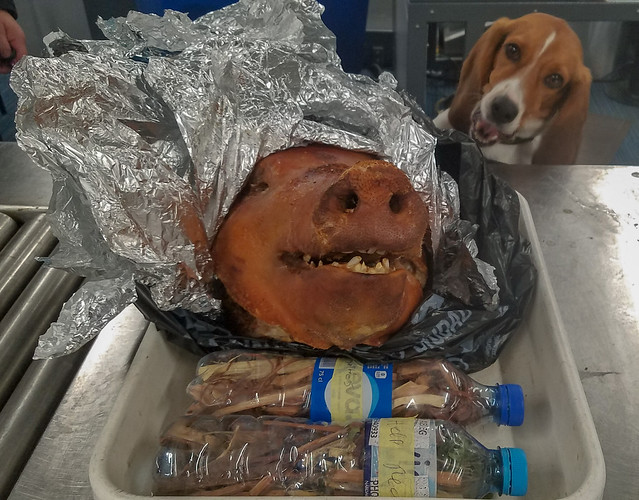
While dogs are man’s best friend, they are also one of the most efficient friends we have in protecting American agriculture and natural resources from the threat of invasive pests. Last month a dog trained by U.S. Department of Agriculture's (USDA) Animal and Plant Health Inspection Service (APHIS)proved that fact when he uncovered a roasted pig head stowed in passenger baggage at Atlanta's Hartsfield-Jackson International Airport. Pork and pork products from other countries are not permitted to enter the U.S. as they could bring diseases like African swine fever and foot and mouth disease to the United States.
In this case, the USDA-trained beagle named Hardy was on his daily patrol with the Department of Homeland Security’s U.S. Customs and Border Protection (CBP) to check baggage for prohibited items when he detected the contraband in baggage coming from Ecuador. Hardy alerted the CBP officer who was then able to obtain and have the prohibited item destroyed before it could do any harm.
“The interagency collaboration to use and train detector dogs undertaken by USDA and CBP has significantly increased our ability to detect prohibited agricultural items that could potentially cause harm to our nation through introduced plant pests and foreign animal diseases,” says Mikel Tookes, CBP’s Deputy Executive Director for Agriculture Programs and Trade Liaison.
To help safeguard American agriculture, USDA selects and trains dogs at the USDA APHIS’ National Detector Dog Training Center (the Center) in Georgia. APHIS’ expert staff train detector dog teams to search for prohibited agricultural products at major U.S. ports of entry (airports and land border crossings). Trained dogs also search cargo facilities and postal distribution centers seeking mailed items that could contain invasive pests and diseases. Dogs have been specially trained to seek invasive animals like nutria in Maryland’s Blackwater National Wildlife Refuge and invasive reptiles on Guam.
“The Center’s staff represents excellence from diverse worlds. We have trainers who honed their skills in the military, some who joined us from law enforcement and another with experience training animals for Disney productions,” said Sherry Williams, Assistant Director, APHIS National Detector Dog Training Center. “This staff shares the ability to bring out the best in dogs that have gone from homeless on the streets, to a shelter or rescue, to the USDA to learn how to safeguard American agriculture.”

The Center specifically trains beagles, beagle mixes, Labrador retrievers, Labrador retriever mixes and Jack Russell terriers that come from animal shelters, rescue groups and through private donations. Canine trainees go through a training program with Center staff before being paired with a handler for two weeks of classroom work and then up to 13 weeks of hands on training. To complete the process, handlers take their dogs to a controlled environment to simulate work scenarios. After the teams pass the training, they are sent out to work detecting prohibited agricultural products that could jeopardize the success and profitability of U.S. agriculture, as well as damage our food supply and cost billions of dollars to control and eradicate if they were to become established here.
Most USDA-trained canines go to work for CBP, the Center’s largest client. But USDA staff and handlers also partner at airports in Puerto Rico and Hawaii to check baggage for prohibited items. Dogs have recently even been used to check that Air Force One was clear of brown tree snakes during a stop in Guam. The detector dog program is one of many ways that USDA is successfully protecting U.S. agriculture.



